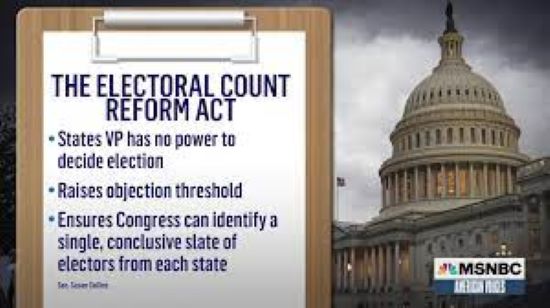|
As most of us settled in to enjoy the holiday season at home with family and friends, our representatives in Washington D.C. raced to finish some last-minute business. Major legislation was passed, the January 6th committee issued its final report, Donald Trump’s tax returns were released, and the 117th Congress faded into the history books, leaving some important business undone. Before turning the page on 2022, my final blog of the year is about some of my thoughts on these issues that emanated from D.C. while the rest of the country was busy with holiday preparations. Donald Trump’s Income Taxes: Today (12/30/2022) House Democrats released six years of former President Donald Trump’s income tax returns. This is the type of thing that excites the politicians in Washington D.C., but for most of Americans it is a yawner. People just don’t care about Trump’s returns. We already know that Trump pays very little in personal income taxes because he uses massive real estate losses and write-offs from his various companies to offset any income. The House has the right to release Trump’s tax returns, but it didn’t have to. It was purely a political move to damage him. What is important was brought to light in a report issued by the House Ways and Means Committee ten days ago. The I.R.S. had failed to audit Trump’s tax returns during the first two years of his presidency, even though it is mandated by I.R.S. policy. It wasn’t until after the congressional committee’s inquiry into the matter as part of its oversight role, did the I.R.S. initiate the audit of President Trump’s tax returns. I don’t think that the Trump White House pressured the I.R.S. into turning a blind eye to Trump’s tax returns. I simply think that the I.R.S. was outgunned by Trump’s army of tax attorneys and accountants, and overwhelmed by Trump’s hundreds of tax entities and tangle of businesses. The I.R.S. just didn’t have the manpower and expertise to do a thorough audit of such a complex tax situation. This is why the Democrats included $80 billion for the I.R.S. in the Inflation Reduction Act , passed earlier this year. House Republicans have threatened to withhold this money from the I.R.S. when they take over the House majority in January. This would be a huge mistake and hypocritical on their part. If the Republicans claim to be the party of fiscal responsibility and low taxes, then they should give the I.R.S. the tools and resources required to collect the taxes that are legally owed. January 6th Committee Report: Last week the House committee investigating the deadly attack on the U.S. Capitol released its final report after 18 months of investigations. The report was issued just weeks before the new Republican controlled House of Representatives will certainly shut down the committee and its investigation. Most people will never read the 800 plus page report, but it is important, if for no other reason than to create the historical record of the most significant act to overthrow the government of this country since the civil war. Congress will probably shelve the report and move on. Now it is up to the Department of Justice (DOJ) to pursue some of the criminal charges that the report recommends be brought against former President Trump. These include inciting or assisting an insurrection; conspiring to defraud the United States; obstructing an official proceeding; and conspiring to make a false statement. Do I think that Donald Trump is guilty of some or all of these charges? Yes! Do I think that the DOJ will indict Trump of any of these charges? Probably not, because they will be difficult to prove in a court of law. According to the committee’s report “The central cause of Jan. 6 was one man, former President Donald Trump, whom many others followed. None of the events of Jan. 6 would have happened without him.” But the American people have decided long ago whether or not they think that Donald Trump is responsible for the Capitol riot on January 6, 2021. Donald Trump will not be held responsible for the events of that day. But he is not out of the woods. He will face serious legal jeopardy for mishandling government documents related to the storage of those documents at Mar-a-Lago, and for his attempt to force election officials in Georgia to change the results of the 2020 election. $1.7 Trillion Spending Bill: Yesterday President Biden signed into law a nearly $1.7 trillion, 4155-page spending bill which will fund the federal government through September 30, 2023. I am always leery of any piece of legislation that is pushed through Congress in the waning days of a term, when no one has completely read or fully understands it. Like most spending bills, there are a lot of goodies tucked into it by politicians at the last minute. But there are two significant parts of the legislation that I agree with. Funding for Ukraine and the overhaul of the Electoral Count Act. Funding for Ukraine: Included in the bill is $45 billion for military, economic and humanitarian assistance for Ukraine. Despite some Republican protests that the Biden Administration has given the Ukrainian’s a blank check, I think that this is money well spent. Consider the trillions of dollars spent on the Afghanistan and Iraq wars which produced no strategic value, and resulted in nothing but death and destruction. Russia is arguably one of the biggest military threats to the United States, and the largest threat to the peace and economic stability of Europe. The war in Ukraine has become the equivalent of a proxy war with Russia, without direct U.S. military involvement and U.S. casualties. The war also unites many of the world’s democracies behind a common cause, and puts a check on Russia’s aggressive expansionary goals. The money spent now in Ukraine is a bargain for the humanitarian and strategic benefits that it will bring. Electoral Count Reform Act: A section of the spending legislation reforms the Electoral Count Act, an 1887 law that governs the counting of Electoral College votes in Congress. The update to the law ensures that electoral votes tallied by Congress accurately reflect each state’s public vote for President. The new legislation clearly defines the role of the vice president to be purely ceremonial during the electoral vote count. The vice president has no power to determine, accept, or reject a state’s electors. This change was in response to President Trump’s attempt to get Vice President Pence to reject certain slates of electors in favor of ones that would win Trump the presidency. The other important change to the law is the raising of the threshold to lodge an objection to electors. An objection will now take 20% of the members of each chamber of Congress. This change will reduce the likelihood of frivolous objections by ensuring that objections are broadly supported. Previously, only a single member of both chambers was needed to object to an elector or slate of electors. Unfinished Business: Title 42 is a health measure put in place by the Trump Administration near the start of the pandemic to restrict migration at the border. In anticipation of the expiration of Title 42 near the end of December, migrants have flooded border crossings and overwhelmed the resources of border towns in the U.S. Last week the Supreme Court blocked the lifting of Title 42, keeping the border restrictions in place. Title 42 has been used more than 2 million times to expel migrants on public health grounds during both the Trump and Biden Administrations. Now the Biden Administration has a few more months to prepare for the eventual expiration of Title 42. Not passing any meaningful legislation to deal with the eventual end of Title 42 is a major failure of the Biden Administration and the 117th Congress. Both Democrats and Republicans are to blame. They prefer the issue to be used as a political football rather than to address the serious security and humanitarian crisis unfolding at our southern border. Good luck passing any legislation on border security or immigration reform during the next Congress. 2022 will be remembered for the Russian invasion of Ukraine, high inflation, and the Federal Reserve raising interest rates seven times in an attempt to curb inflation. Financial markets were turbulent all over the world, and the bloom came off of crypto currencies. Even with our best efforts to ignore it, COVID would just not go away, so the world endured a third year of the pandemic. Despite all that, Americans remain an optimistic lot, me included. I look forward to 2023 with renewed optimism and hope that the new year will be better than the last. If you enjoy reading this type of commentary please subscribe to my blog and tell a friend. You will receive an email notification when new blogs are posted. The email will come from the site’s email: armchairamerican1776 @gmail.com.
Thanks, Armchair American
0 Comments
Later this month President Biden will sign into law the Respect for Marriage Act. Even though this law won’t be perfect, it does provide some very important protections for same-sex and interracial couples, and should be considered a holiday gift to the American people in the waning days of the 117th Congress. What is the Respect for Marriage Act? The bill was approved by the House of Representatives in July and then moved to the Senate for consideration. After the inclusion of an amendment which provides certain protections to nonprofit religious organizations, the bill was passed by the Senate on November 22, 2022. All Democrats and 12 Republicans voted for the bill, getting it past the 60 votes needed for passage. Since the House version of the bill was amended in the Senate, it will return to the House for a final vote. This should happen within the next two weeks before going to the President for his signature. For the purposes of federal law, the bill redefines the definition of marriage, and requires all states to recognize any marriage that was legal in the state where it was entered into. The bill also prohibits polygamous marriages, and protects religious organizations who refuse to perform marriage ceremonies that are counter to their beliefs. Revised Definition of Marriage: The bill repeals the Defense of Marriage Act, which defined marriage as “a legal union between one man and one woman as husband and wife”. Under the new bill, the federal government will recognize any marriage between two individuals which is valid in the state where the marriage was entered into. This gives same-sex and interracial couples equal treatment under the law as any other married couples. New Protections: All states must recognize the marriages of couples legally married in other states. State officials must afford the same rights and protections to all married couples, regardless of the sex, race, ethnicity, or national origin of the individuals involved. Even though all 50 states currently allow same-sex and interracial marriages, these marriages are not protected by federal law, and are subject to the whims of the Supreme Court and state officials. Religious Protections: Senate Republicans would never have voted for the bill without the support of the religious right and some major religious organizations. These organizations were worried about losing their precious tax-exempt status if they didn’t go along with the provisions of the bill. In order to win the support of the religious right, Senate Republicans negotiated with Democrats to amend the House version of the bill. The amendment won the support of the Mormon church, the Council for Christian Colleges and Universities, the Union of Orthodox Jewish Congregations of America, and the National Association of Evangelicals. The bill provides the following protections:
Many on the left and in the LGBTQ community oppose the protections given to religious organizations. They view the religious protections as a way to deny same-sex couples the rights and freedoms that other couples enjoy. This may be true, but it is the first major piece of federal legislation that balances the needs of same-sex couples and of conservative religious groups. Without the religious protections, the bill would never have passed the Senate, and the bill wouldn’t become law. Why is the Respect for Marriage Act Needed? The Supreme Court has already ruled that the federal government must recognize same-sex marriages (United States v. Windsor), and the Court’s 2015 ruling in Obergefell v. Hodges requires all states to grant same-sex marriages and recognize same-sex marriages granted in other states. It seems as if same-sex marriages are already protected by Supreme Court rulings, so why the need for a new federal law? The makeup of the Supreme Court can change over time and prior rulings can be overturned. When the Supreme Court overturned Roe V. Wade this summer, the country learned that rights may be taken away if they are not written into law. In his opinion in the case overturning Roe v. Wade, Justice Clarence Thomas wrote that the Court “should reconsider” Obergefell v. Hodges. This set off alarm bells across the country, and many saw this as a direct threat to the national recognition of same-sex marriage. The Respect for Marriage Act was passed by Congress to counter that threat. It is the job of Congress to write laws, not the Supreme Court. To protect and preserve the rights of same-sex and interracial couples, it is up to Congress to codify those rights into law, and not let nine unelected justices make a decision which would impact millions of Americans. What this Bill Doesn’t Do: Marriage is largely regulated by the states. Each state determines who is allowed to marry and how a marriage can be dissolved. The Respect for Marriage Act doesn’t force states to issue marriage licenses to same-sex or interracial couples. If the Supreme Court overturned Obergefell v. Hodges, as Justice Thomas has hinted at, many same-sex couples would be forced to leave their home state to get married. This will have to be addressed in future legislation. The Respect for Marriage Act does not resolve the conflict over whether private businesses can be forced by law to provide goods and services for same-sex or interracial weddings. The Supreme Court is currently hearing arguments on a case about whether a web designer can be forced to provide her services to create a wedding web site for a gay couple, which goes against her religious beliefs. This case will probably be decided in June. There are over 1 million same-sex couple households in the United States according to the latest census data. Nearly 60% of these couples are married. Over 10% of all marriages are either interracial or interethnic. These marriages are currently protected by previous rulings of the Supreme Court. But current or future Courts could overturn these protections. Thirty-five states have bans on same-sex marriages on their books. Many of these bans would go into effect if rulings such as Obergefell v. Hodges were overturned. Interracial marriages could also come under threat by future Courts, without the protection of a federal law. As stated in the Respect for Marriage Act, “millions of people, including interracial and same-sex couples, have entered into marriages and have enjoyed the rights and privileges associated with marriage. Couples joining in marriage deserve to have the dignity, stability, and ongoing protection that marriage affords to families and children”. Though not perfect, the Respect for Marriage Act will help to preserve some of these rights and privileges.
Sometimes good things do come out of Washington D.C. One of them is the Respect for Marriage Act, just in time for the holidays. If you enjoy reading this type of commentary please subscribe to my blog and tell a friend. You will receive an email notification when new blogs are posted. The email will come from the site’s email: armchairamerican1776 @gmail.com. Thanks, Armchair American |
AuthorThe Armchair American. Archives
November 2024
Categories
All
|




















 RSS Feed
RSS Feed